In a world rife with political discontentment and seemingly more discord than tolerance, it is easy to lose sight of elements that bring people together. Inspired by a purposeful , yet experimental, idea to inspire people to find their humanity, an Egyptian- Canadian filmmaker invited seven Americans to travel to Egypt on an all-expenses paid vacation for 10 days.
In a collision of East meets West, the seven Americans were paired up with five Egyptians with vastly differing backgrounds and identities to engage in conversation and face their stereotypes.
Starting simple: planting the project seed
Tarek Mounib’s idea came to him after weeks of monitoring pro-Trump and racist rhetoric in the United States. Appalled and concerned with where politics and citizen ideology was heading, the idea came to him on a tram in Zurich.
A simple idea that definitely needed execution became the basis for how the project would take form: wouldn’t it be kind of great, instead of running away from Islamophobes and racists, to actually engage with them and offer them something kind?
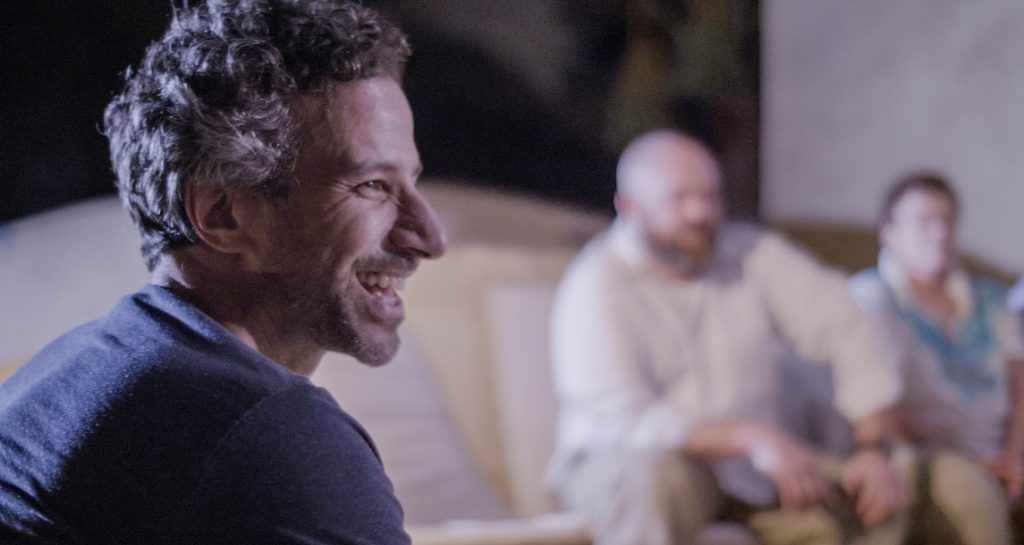
“The idea was to give them some sort of treat, like a vacation and talk and speak and meet. I think it has been successful because we weren’t trying to educate anybody. We weren’t trying to make Muslims look good, or Egyptians look good – we were just trying to get people to meet at a human level and see what magic can happen,” explains Tarek to Egyptian Streets.
Merely getting different individuals to talk and discuss is the principal aim of the film. Unlike what many believe, the filmmaker and his team did not seek to convert or change the participants.
From idea to product: realizing the film
Tarek was passionate about his film idea and sought out to achieve it by any means possible. Although he didn’t have a film background, he did have the skills to bring good talent together and form teams. Initially he tried to look at Swiss production companies for this specific project and although they were professional and deserving of their reputation, Tarek felt the companies missed the ‘essence of the project’ .
Through additional search, he came in contact with Ingrid Serban and her husband whom Tarek immediately believed would be his direct and co-productor in January 2017.
According to Tarek, Ingrid (the director) is “someone whose life task is to bring real people’s lives to screen – that’s what we wanted to do. We really wanted the Americans and the Egyptians to be portrayed as they were- the human beings that they were beyond the facade. “
The team, fueled by a sense of appealing to a larger audience, also engaged Adam Saleh, the famous YouTube prankster and celebrity, on board. Teaming up, Saleh brought humor to the engagement with strangers while Tarek engaged with passerby’s and citizens, debating and exchanging serious views.
From January to June, the crew dedicated its time to executing the project.
Tarek flew from to different states and attended countless rallies to secure his participants. Kindness films, the company behind the production which is headed by Tarek, was continuously on the streets; they did radio shows, internet advising and created a page on Facebook which was flooded with doubt and hate.
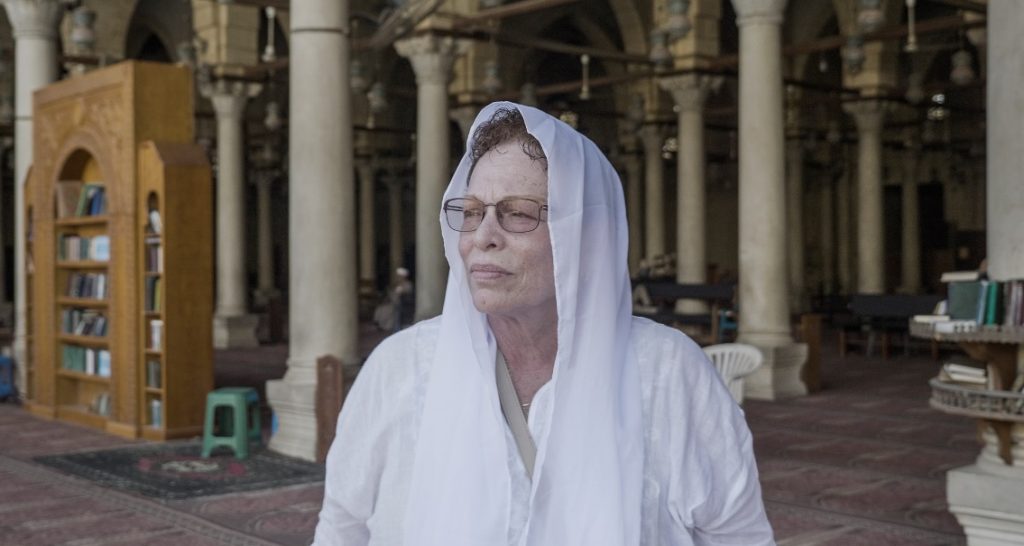
“We were trying to find a profile of someone whom we described as “anyone concerned with an islamic threat,” he explains with a laugh. This proved to be a daunting and difficult task as those interested in flying to Egypt must not be too eager to .
“There were a lot of people who wanted to come, but by nature, if you wanted to come then you weren’t the right person,” he continues ”it was hard to find that balance: if you didn’t want to come you wouldn’t come but the chosen seven had the right kind of apprehension and yet enough courage to overcome that apprehension, so they had the right balance between concern and willingness to come.”
The chosen Americans, as per the enthusiastic filmmaker, were a true reflection of the United States: seven diverse individuals as men, women, young, old, black and white.
Each American participant was paired up with an Egyptian counterpart which Tarek was also careful in choosing as the team wanted to get a variety of Egyptians ranging from secular to religious although there was more eagerness and more qualified Egyptians who wanted to take on the hosting task.
The American participants flew into the country on July 1st where they stayed in Egypt for 10 days, not knowing the program.
They started their journey in Gouna, El Hurghada, which was Tarek’s idea of a peaceful and relaxing transition to what was to come in Cairo.
Every day, the participants spent the entire day with their ‘Egyptian’ hosts, thus, there were five separate camera following the separate journeys. Only for group activities like visiting the pyramids or perusing the Egyptian museum that the entire group came together.
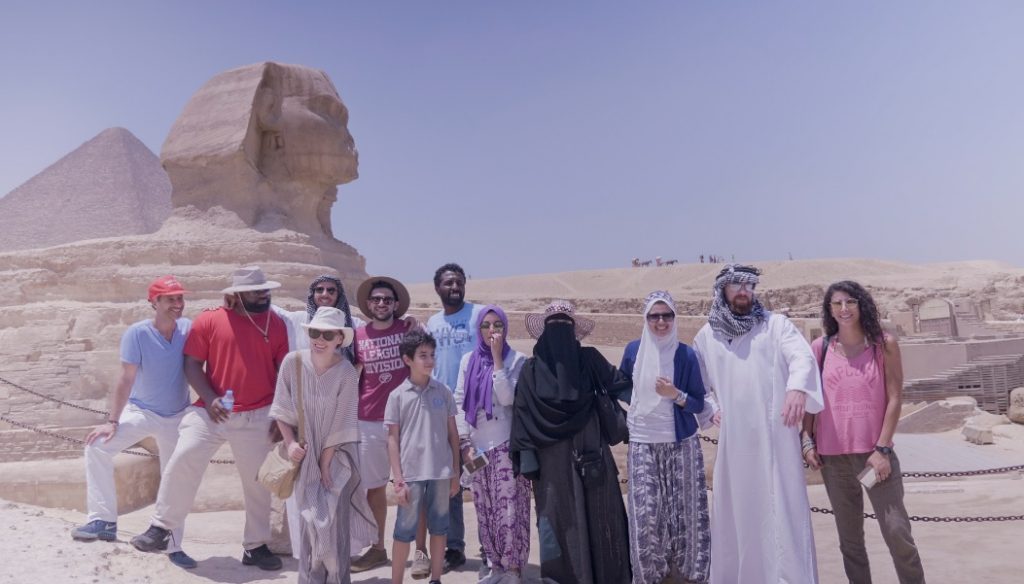
At the end, the team recorded 250 hours of camera footage which were condensed into an hour and a half. For this task, Tarek highly praises his production team which have had an array of experience prior to this project such as Pierre Haberer (contributing talent) and Kurt Engfehr (co-producer of Bowling for Columbine).
“Free trip to Egypt” went through six pre-screenings in November 2018; it was screened in LA, New York, Washington, Arizona, Kentucky and Anne arbor, Michigan where the audience was completely unique to each city. However, as per Tarek, the film succeeded in moving the audiences unanimously and creating an environment of discuss and optimism.
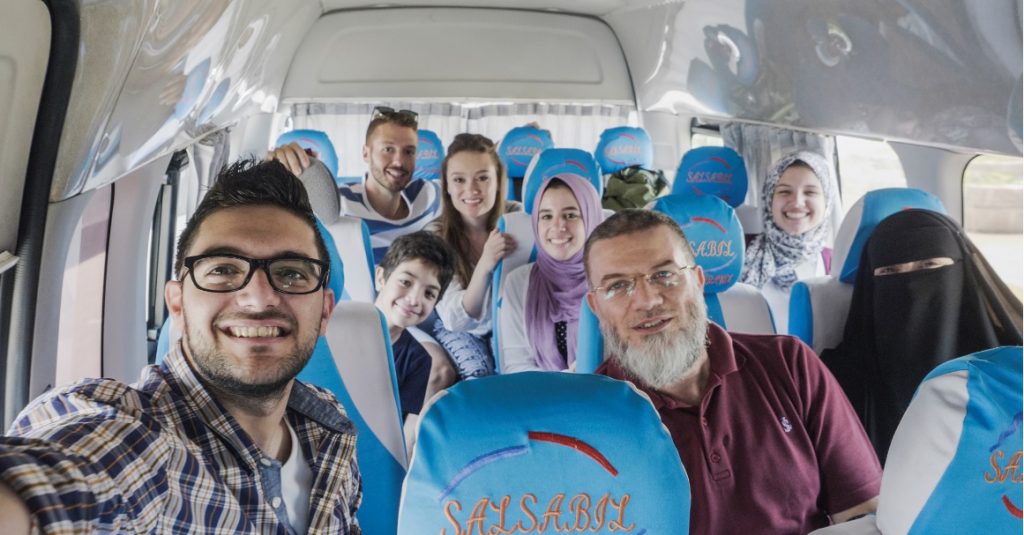
As it stands, “Free Trip to Egypt” will premiere in hundreds of theaters in the US in June 2019. Since it is based on a hybrid distribution model, Kindness Films is not planning on selling the film. Instead, it is focusing on organizing community days where the films can be screened.
From person to person, a transatlantic connection
Naturally, the project did not come with own sets of setbacks. Not only did the film’s official social media pages receive countless backlash and criticism, even media that the filmmakers attempted to contact didn’t trust that the project would materialize. Many also, noting Adam Saleh’s participation, though the entire project a farce. The turning and encouraging moments, however, came when Tarek started interacting face to face with the very demographic he had concerns about.
“You realize most people are decent and not everyone is racist. Almost every Trump supporter I met said “I know he says stupid things but” and then they explained what’s important to them and why they’re voting for him. I realized people aren’t supporting him because all of the racist rhetoric but because they’re fed up with this or that,” admits Tarek frankly.
He believes that the concerns of those visiting in Egypt were the standards one. While many know Egypt for its favorable beach-climate and rich culture, making it a premiere holiday destination with its friendly and touristic environment, others cannot shy away from seeing that Egypt lies at the heart of the ‘Middle East’ – a dangerous area, riddled with terrorism and political instability.
The pairing of the participants was strategic:a Trump rally supporter with a beautiful Egyptian dancer, a Jewish school teacher with Egyptian revolutionary Ahmed Hassan, a police officer with a journalist, two photojournalists together and an orthodox Christian woman with a Niqabi Egyptian.
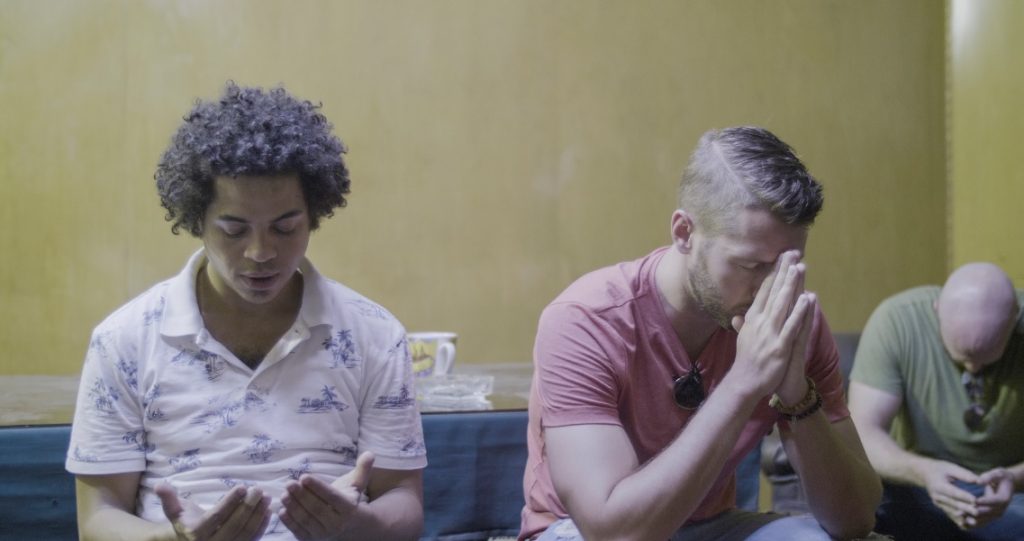
Surprisingly, unlike what is most expected, the group was overall able to get along.
“It was really interesting because the woman who covered her face , I think the Americans were much more comfortable with her than the other Egyptians. I think when she walked in the room, many Egyptians felt very awkward [about her niqab] and aren’t used to that,” noted the Egyptian-Swiss-Canadian filmmaker who also drew the similarities between the orthodox Christian and Muslim participants.
It was significant for the team to address all the taboo topics heads on; it did not shy away from discussing religion and politics not in the hopes of changing the mentality of the participants or making the individuals more ‘open-minded’ but simply to create a safe environment of expression.
In today’s modern day climate of political correctness and citizen warrior moral values, many fear opening up about their most controversial ideologies, fearing public or online shame.
“I just want to bring back civility in conversation. we want to have space for everybody. some people had strong religious views and some anti religious view and yet we got along when you create the safe container of respect,” says Tarek who went on to say that one of the first people to sign up to his PledgeToListen campaign was, in fact, an American Trump supporter.
The PledgeToListen movement is one of the many significant outcomes of the Kindness film project. It is a simple that aims to listen to those with opposing points of views, attempt understanding and express one’s own point of views with civility and respect.
A message of hope and tolerance
Tarek recognizes that each American participant had a different journey in Egypt, with varying outcomes. However, he believes everyone was able to find common ground in acceptance.
“Every american and Egyptian went away with the feeling that we’re not so different. We’re human beings and we have love in our hearts; it created a sense of hope in all of us. If we could get along and survive these ten days with such a diverse group of people, why not the rest of the world?” says Tarek.
As such, the PledgeTo Listen movement is inspired by that short-term co-existence. Tarek believes that this is the result of civility in treatment, deep listening and authentic conversation; for him, it an a illustrious ‘magic’ that is worth retrieving and getting others to experience.
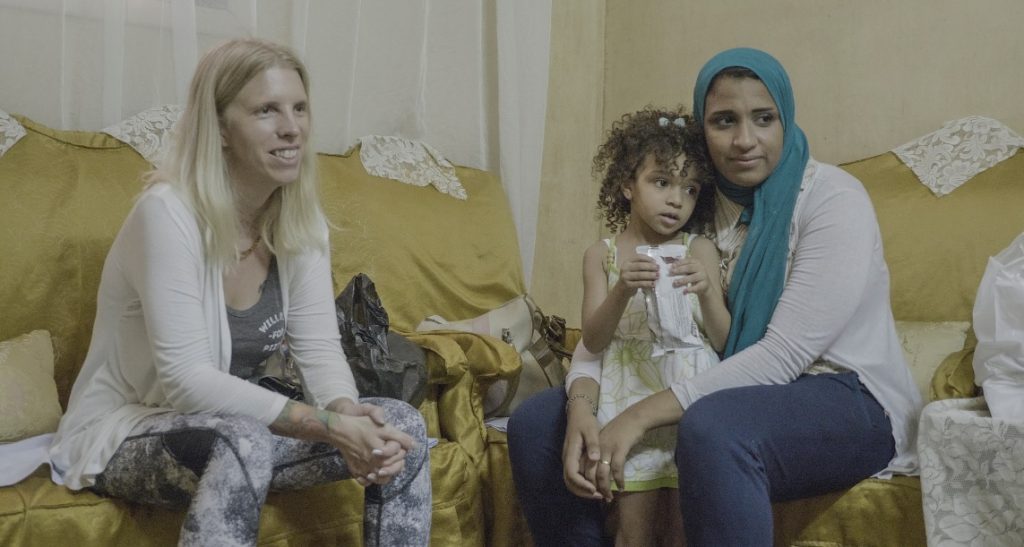
The filmmakers are planning on having “PledgeToListen” unity days where different communities and religious congregations, such as mosques and churches or Democrats and Republicans, can come together and watch the discussion-triggering film.
The film, at the very end, is about coming together despite differences; it is not a film about exposing Islamophobes or trying to educate people about the beauty of Egypt.
“The Egyptians in the [screening audiences] saw how this film is just about humanity, it’s not about praising Egyptian civilization. What’s important is how we connect as human beings. I am more optimistic that Egyptians will love the film even if it’s not a film about trying to make Egypt look good,” Tarek says.
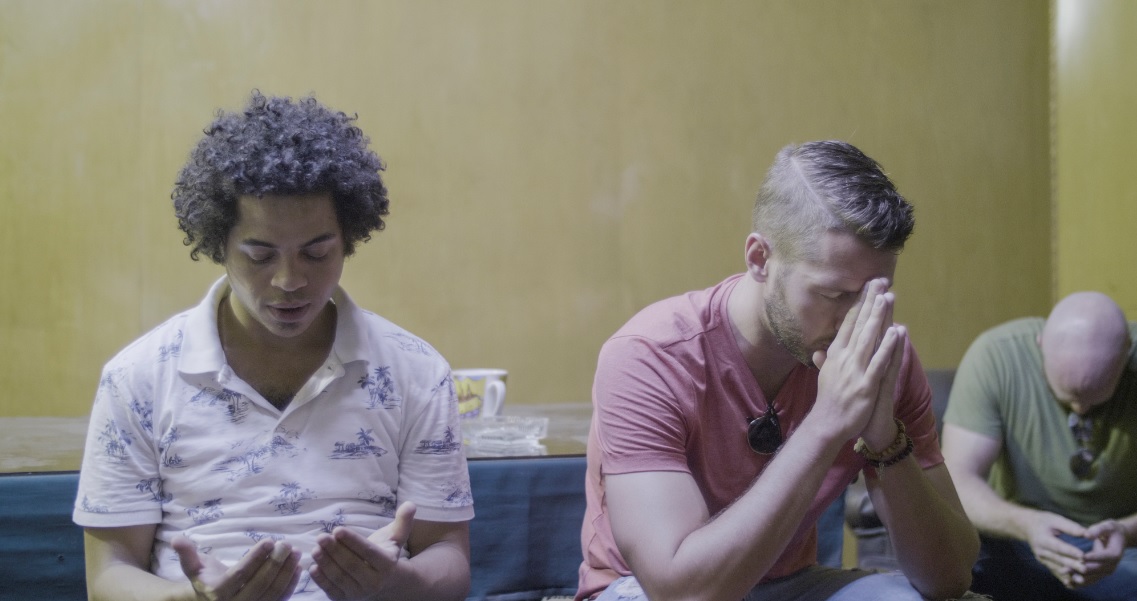



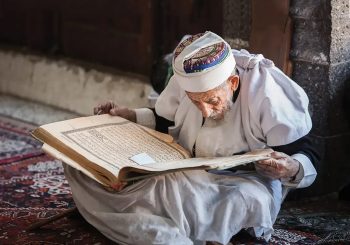
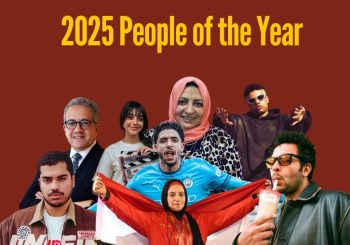

Comments (0)